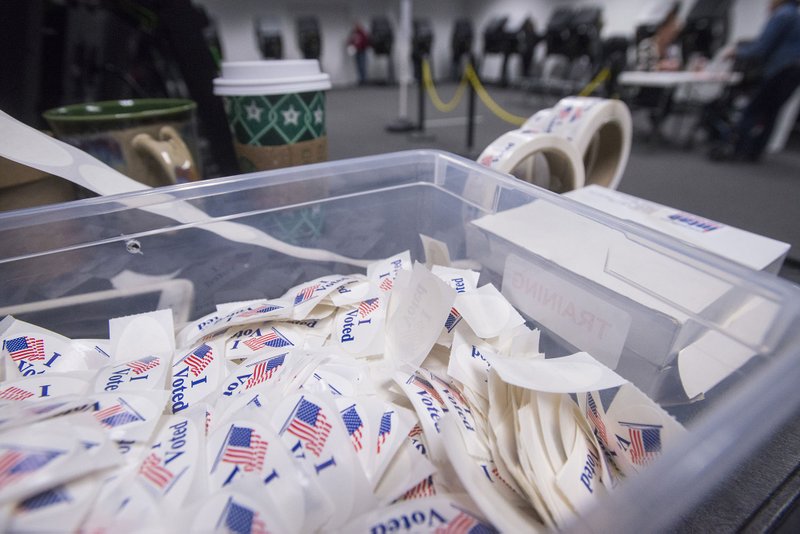Arkansas' absentee ballot system fails to protect voters' rights and deprives them of due process at a time when "those protections have never been more vital," attorneys argued in a lawsuit filed Tuesday.
The League of Women Voters of Arkansas and two registered voters alleged in their lawsuit that the state's requirements for accepting absentee ballots are unconstitutional and that history has shown that a significant number of ballots are wrongly rejected every election cycle. That won't change, attorneys said, unless the law is changed.
The lawsuit -- which names Arkansas Secretary of State John Thurston and several members of the state Board of Election Commissioners as defendants -- was filed Tuesday in U.S. District Court in Fayetteville.
Because of covid-19 concerns, more absentee ballots are expected during the coming election than in previous elections, officials have said. Election Day is Nov. 3.
Voters need time to ensure that their votes are counted and that their ballots aren't discarded on Election Day over any perceived signature mismatch or other issue, said John Powers, a Washington, D.C., attorney with the Voting Rights Project at the Lawyer's Committee for Civil Rights Under Law. Powers is representing the plaintiffs on behalf of the committee.
[RELATED » Full coverage of elections in Arkansas » arkansasonline.com/elections/]
"Absentee ballots are rejected in every election by Arkansas officials for minor discrepancies," Powers said, adding that future problems can't be averted "unless the current law is struck down."
Two spokesmen for Thurston's office did not return messages seeking comment on the lawsuit Tuesday.
Powers said some of the extra time election officials have during early voting can be spent checking the signatures on absentee ballots that have already been received by election offices. There would be no need to wait until Election Day to check those ballots, Powers said.
That is what the lawsuit is seeking to do: urge election officials to start checking signatures on absentee ballots sooner and across multiple days, he said.
If election commissioners meet various times during that 15-day early-voting period to review those signatures, many of those issues could be cleaned up and those ballots could be counted, according to the plaintiffs.
"What we're asking is that the election commissioners get to use their rubber stamp on them before Election Day," Powers said.
In Arkansas, county clerks verify voters' signatures on absentee ballot applications by comparing them against the signatures on file with their voter registration information. If the signatures match, a ballot is mailed.
The deadline to request an absentee ballot by mail or electronically is Oct. 27, but state and county election officials have asked residents to plan how they are going to vote.
Federal and local officials have cautioned that small hiccups are likely because of the steep increase in absentee voting.
The two registered voters who are plaintiffs are Robert Allen, a Pope County resident, and John McNee, a Pulaski County resident.
Allen, 73, is a college professor who has a brain tumor and has undergone surgery and "intensive chemotherapy" since he submitted his application for a mail-in ballot. Therefore, his handwriting "is inconsistent and getting messier," according to the lawsuit.
McNee, 71, is an attorney with a heart condition and a prosthetic heart valve. He, too, has inconsistent handwriting, attorneys said. Their signatures already now look different from when they filled out their applications for an absentee ballot, the lawsuit stated.
Both men realize that and want to ensure that their ballots are counted, Powers said.
It isn't fair or legal to have election commissioners, or "laypeople," comparing signatures at the last minute on Election Day, according to the lawsuit.
"The key in all of this is that no one is saying county officials aren't doing their best when it comes to counting votes," Powers said. "They have an incredibly hard job as it is. But with a record number of voters and absentee voters this time around, they will have a lot on their plate. They are being asked to do an impossible task."
Election commissioners don't need to open up the ballot to look at signatures. They would only be looking at the signed statement on the outside of the ballot, Powers said. He insisted that the process would not require opening anything or invading voter privacy.
Pulaski County Clerk Terri Hollingsworth told the Arkansas Democrat-Gazette last month that the county had already exceeded the absentee ballot application total from 2016.
"These are unprecedented times, and we're getting an unprecedented amount of requests," Hollingsworth said at the time.
Before the end of August, Pulaski County had already received 10,000 or so applications. Signature discrepancies for the applications have been extremely rare, officials said at the time.
Hollingsworth and others downplayed any issues with signature matches.
"We're talking a percentage of a percentage here," Jason Kennedy, Pulaski County's assistant chief deputy clerk, said at the time.
When faced with a signature discrepancy on absentee ballot applications, county clerks can search for a matching signature in old records or ask the voter to visit the office for verification, according to the secretary of state's office. However, there's no set protocol.
Regardless of the confidence conveyed by election officers related to absentee ballot applications, the plaintiffs are seeking a change in the legal process of counting the actual absentee votes to make sure there aren't indications of large numbers of ballots being discarded.
"Arkansas voters could have confidence that their vote would count if there were a process for fixing issues when their ballots are marked for rejection," said Nell Matthews, president of the League of Women Voters of Arkansas.
"With the surge in absentee ballots this year because of covid-19, many of our most vulnerable voters are at risk of disenfranchisement without a notice and cure protection. No one should have their vote thrown out due to a small signature error or mismatch."
